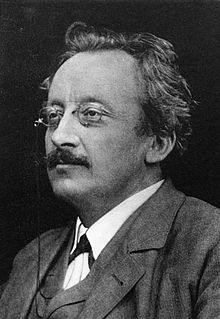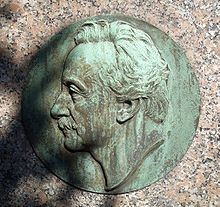Gustav Roethe
Gustav Roethe (born May 5, 1859 in Graudenz , † September 17, 1926 in Bad Gastein , Austria ) was a German medievalist. He was a professor of German philology at the University of Göttingen and at the Friedrich-Wilhelms-Universität zu Berlin .
Life
Roethe studied classical philology and German in Göttingen, Leipzig and Berlin. In 1881 he was promoted to Dr. phil. PhD. In 1886 he completed his habilitation in Göttingen, and in 1888 Roethe became an associate professor there. In 1902 he became a full professor for German studies at the Friedrich-Wilhelms-Universität, Berlin. He was a member of the Royal Society of Sciences in Göttingen (1893), the Prussian Academy of Sciences (1903), the Bavarian Academy of Sciences (1919) and the Austrian Academy of Sciences (1919). From 1911 Roethe was permanent secretary of the Berlin Academy of Sciences. In 1923/24 he was elected rector of the Berlin University. From 1922 to 1926 was President of the Goethe Society in Weimar.
politics
Even before 1914, Roethe had positioned himself politically as an opponent of parliamentarism and women's studies; in his letters he appears as an outright anti-Semite. After the First World War he exposed himself as an aggressive opponent of the Weimar Republic. Roethe became a member of the German National People's Party (DNVP) and was from 1919 to 1926 chairman of the "Reich Committee of German National University Lecturers". At the founding meeting of the “German National Teachers Association” he announced: “Parliamentarism is dilettantism elevated to a principle”; He publicly dismissed the Weimar Constitution as a “ridiculous work”.
Research priorities
The focus of his research included Middle High German literature , German Romanticism and the work of Goethe. With his work "Die Gedichte Reinmar von Zweter " (1887) he created the research basis for the history of Middle High German sang-verse poetry . In 1904 he founded the series of German texts from the Middle Ages . In 1905 he published guidelines for the edition of German texts from the Middle Ages . In 1908 he was involved in the reorganization of the German dictionary of the Brothers Grimm . Waldemar Oehlke was one of Roethe's pupils .
Publications
- The German Emperors and German Literature. Speech to celebrate the birthday of His Majesty the Emperor and King on January 27, 1893 , 1893
- Speech to celebrate the centenary of Kaiser Wilhelm I's birthday , 1897
- Brentanos Ponce de Leon, a secular study , 1901
- From the literary audience in Germany , 1902
- Humanistic and national education. A historical reflection , 1905
- German heroism , 1906
- German intellectual life in the Eastern Marches , 1913
- Of the German way and culture , 1915
- Dr. Martin Luther's importance for German literature. A lecture on the anniversary of the Reformation , 1918
- German poets of the 18th and 19th centuries and their politics. A patriotic lecture , 1919
- Goethe's Campagne in France 1792. A philological study from the World War , 1919
- Bismarck, Arndt and the German Future. An address to the Greifswald student body at the solstice celebration , 1920
- Commemorative speech for Heinrich Morf , 1921
literature
- Christoph König (Ed.), With the collaboration of Birgit Wägenbaur u. a .: Internationales Germanistenlexikon 1800–1950 . Volume 3: R-Z. de Gruyter, Berlin / New York 2003, ISBN 3-11-015485-4 , pp. 1506-1509.
- Jörg Judersleben: Philology as National Education . Gustav Roethe between science and politics . Peter Lang, Frankfurt am Main a. a. 2000 (= Berlin contributions to the history of science; 3)
- Regest on the correspondence between Gustav Roethe and Edward Schröder , ed. v. Dorothea Ruprecht u. Karl Stackmann. Vandenhoeck u. Ruprecht, Göttingen 2000,
- Dorothea Ruprecht: Roethe, Gustav. In: New German Biography (NDB). Volume 21, Duncker & Humblot, Berlin 2003, ISBN 3-428-11202-4 , p. 753 f. ( Digitized version ).
Web links
- Literature by and about Gustav Roethe in the catalog of the German National Library
- Newspaper article about Gustav Roethe in the 20th century press kit of the ZBW - Leibniz Information Center for Economics .
Individual evidence
- ↑ Klaus von See , Gustav Roethe and Edward Schroeder . A Germanist correspondence 1881–1926 . In: ders .: ideology and philology. Essays on the history of culture and science , Heidelberg 2006, p. 156 f.
- ↑ Michael Grüttner u. a .: The Berlin University between the World Wars 1918–1945 (= History of the University of Unter den Linden , Vol. 2), Berlin 2012, Akademie Verlag, p. 150.
- ↑ in Victor Junk (ed.): Rudolfs von Ems Willehalm von Orlen. (= German texts from the Middle Ages. Volume 2). Berlin 1905, p. V f.
| personal data | |
|---|---|
| SURNAME | Roethe, Gustav |
| BRIEF DESCRIPTION | German Germanist |
| DATE OF BIRTH | May 5, 1859 |
| PLACE OF BIRTH | Graudenz |
| DATE OF DEATH | September 17, 1926 |
| Place of death | Bad Gastein |

